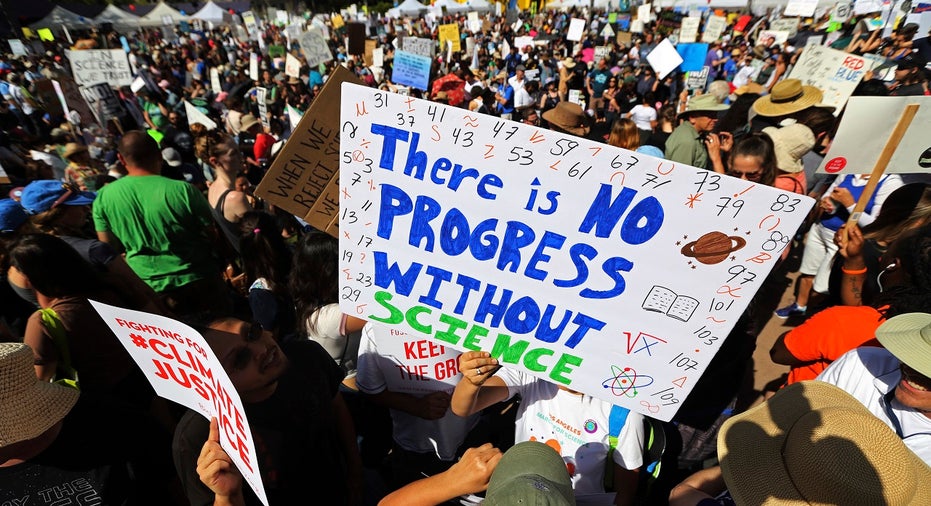March for Science Draws Big Crowds Across U.S.

Thousands of people turned out in cities across the United States and beyond on Saturday for Earth Day events billed as a "celebration of science" to counter what organizers say is a growing disregard for evidence-based knowledge in Washington.
The "March for Science" festivities included scientific "teach-ins," speeches by researchers and environmentalists, and musical performances on Washington's National Mall under cloudy skies with occasional drizzle.
Hundreds of cities and towns from Boston to Sydney, Australia hosted rallies and festive parades where marchers carried signs like "There is no Planet B" and "Make Science Great Again," making a play on U.S. President Donald Trump's campaign promise to "Make America Great Again."
While the events were non-partisan according to organizers, many marchers were in effect protesting Trump's proposal to sharply cut federal science and research budgets and his administration's skepticism about climate change and the need to slow global warming.
The marches put a new twist on the traditional Earth Day activities, the aim of which was to reaffirm "the vital role science plays in our democracy," according to the march's website.
"It's important to show this administration that we care about facts," said Chris Taylor, 24, who was part of an early crowd of about 15,000 who gathered on Washington's Mall for teach-ins on topics like climate change, water quality and sustainable food. The event finished with a march from the Washington Monument to Union Square.
"It just seems like they're not really concerned about economic growth or creating new technologies, just catering to massive corporations," said Taylor, who is earning a PhD in robotics at George Mason University in Virginia.
A fervent but good-natured anti-Trump tone was evident on San Francisco's waterfront, where thousands gathered near The Exploratorium science museum ahead of a march to city hall.
Many carried signs emblazoned with slogans such as "Pruitt Plus Trump Equals Bad Chemistry," a reference to Scott Pruitt, the new head of the Environmental Protection Agency, who has questioned the scientific consensus on global warming.
March for Science is the latest in a series of national demonstrations staged since Trump's inauguration nearly 100 days ago. Previous marches and protests have focused on a range of partisan issues, from abortion rights to immigration policy.
The White House did not respond to a request for comment on Saturday's marches, but Trump released a statement on his approach to environmental issues.
"My administration is reducing unnecessary burdens on American workers and American companies, while being mindful that our actions must also protect the environment," Trump said.
"Rigorous science is critical to my administration's efforts to achieve the twin goals of economic growth and environmental protection," said the president, who passed dozens of protesters as his motorcade made its way to Walter Reed National Military Medical Center outside Washington.
In the past, Trump has said climate change was a hoax that was stifling policies to foster economic growth.
His administration is considering withdrawing from the Paris Agreement, a global accord aimed at reducing global emissions of carbon dioxide and other greenhouse gases. Last year the United States, under President Barack Obama, joined more than 190 other countries in signing the pact.
Trump's proposed 2018 budget calls for deep spending cuts by government science agencies, including a 31 percent reduction for the Environmental Protection Agency.
March organizers are also worried by what they see as growing skepticism from politicians and others on topics such as vaccinations, genetically modified organisms and evolution.
The scientific community's direct involvement in a national policy debate has stirred some criticism about whether scientists should get involved in politics. But organizers have defended the march as crucial because of the threat posed by discrediting scientific consensus and restricting research.
"As scientists, as human beings, our mandate is clear - it's to stand up for what we know to be true," said Kellan Baker, a senior fellow at Johns Hopkins School of Public Health and one of the speakers on the National Mall.
That theme was echoed by many who showed up in Washington for teach-ins, which organizers said were a centerpiece of the initial Earth Day held in 1970 to call attention to the environment.
"Science isn't respected and it needs to be," said Sarah Binkow, 22, a civil engineer who traveled from Pontiac, Michigan, to attend the Washington rally.
"Being here definitely gives me hope that there's this overwhelming population that supports science and supports scientific theory," she said.
In Washington, speakers included Bill Nye, an educator and television personality known as "the Science Guy," and Mona Hanna-Attisha, a pediatrician and public health advocate who first called attention to the high levels of lead in the drinking water of Flint, Michigan.
"Flint is what happens when we dismiss science," she said, referring to the 2014 crisis.
(Additional reporting by Ian Simpson in Washington, Frank McGurty in New York, Brian Snyder in Boston; Writing by Frank McGurty; Editing by Chizu Nomiyama)



















